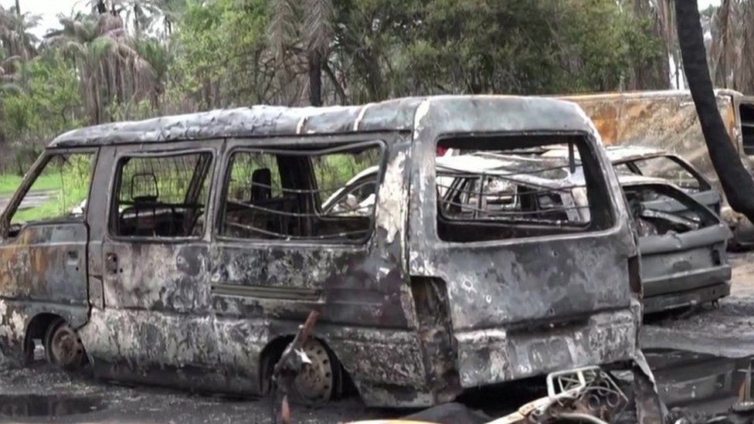Nigeria's president has said the country is in "shock and trauma" following the deaths of at least 100 people from an explosion at an illegal oil refinery.
President Muhammadu Buhari described the incident in Imo state, southern Nigeria, as a "catastrophe and a national disaster".
Many victims were burnt beyond recognition.
The police are now looking for the owner of the illegal refinery.
The damage to fishing and farming caused by the oil industry over the decades and the failure to share the oil wealth has led some to find other ways to make money.
Illegal refining is attractive as in parts of the oil-rich Niger Delta it is seen as being relatively easy to pull off, despite efforts to halt the practice.
Dozens of people were thought to have been working at the refining plants when they were caught in the huge fire.
The death toll has risen as emergency workers go through the scene. Ifeanyi Nnaji of the National Emergency Management Agency told BBC Igbo that the number killed now stood at 109.
"We learnt many bodies are in nearby bushes and forests as some illegal operators and their patrons scampered for safety," he earlier told the AFP news agency.
Charred human remains, as well as fragments of belongings, such as flip flops, bags and clothing, were witnessed across the scene of the disaster by a journalist for the Reuters news agency.
In a statement on Sunday, Mr Buhari offered his condolences to families of the victims and said those responsible for the explosions must be caught and brought to justice.
The authorities have been struggling to curb the proliferation of illegal plants where stolen crude oil is refined. The president ordered security forces to intensify efforts to shut these refineries.
It is not yet clear what caused the explosion that happened sometime overnight into Saturday, but accidents have been common in the past at similar dangerous sites where safety measures are not enforced.
There have been concerns over a lack of precautions at such facilities as well as over the environmental pollution they cause.
But Nigeria's official oil refineries do not work to capacity, causing frequent fuel shortages and price increases across the country.
Latest Stories
-
Total mobile money transactions hit GH₵365bn by April 2025
2 minutes -
Minority accuses Finance Minister of breaking the law over unpaid statutory funds
9 minutes -
Audit Service defends report, dismisses UTAG-UG allegations
10 minutes -
Sports and Recreation Ministry adopts Amartefio Committee recommendations
12 minutes -
Attack on my manager at AfroNation Portugal made me see things differently – Gyakie
19 minutes -
High Court withdraws arrest warrant against Director of Passports – Foreign Affairs Ministry confirms
19 minutes -
GPL: Kassim Mingle named Coach of the Month award for April
27 minutes -
Mpox cases in Ghana reaches 9 – GHS
33 minutes -
Akrobeto survives car accident on Accra-Kumasi highway
51 minutes -
GPL: Nations FC’s Rabin Ousmane Sanon wins Goalkeeper of the Month for April
53 minutes -
Trump threatens Apple with a 25% tariff if it doesn’t build iPhones in America
54 minutes -
NADMO confirms 5 deaths in Accra floods, blames poor drainage, urban planning failures
55 minutes -
William Amponsah earns All-American honours with NCAA win
1 hour -
Opportunity International CEO Kwame Owusu-Boateng named ‘Male Personality of the Year’ at Ghana Executive Awards 2025
2 hours -
The 8-Step process to buy a house in Ghana
2 hours

